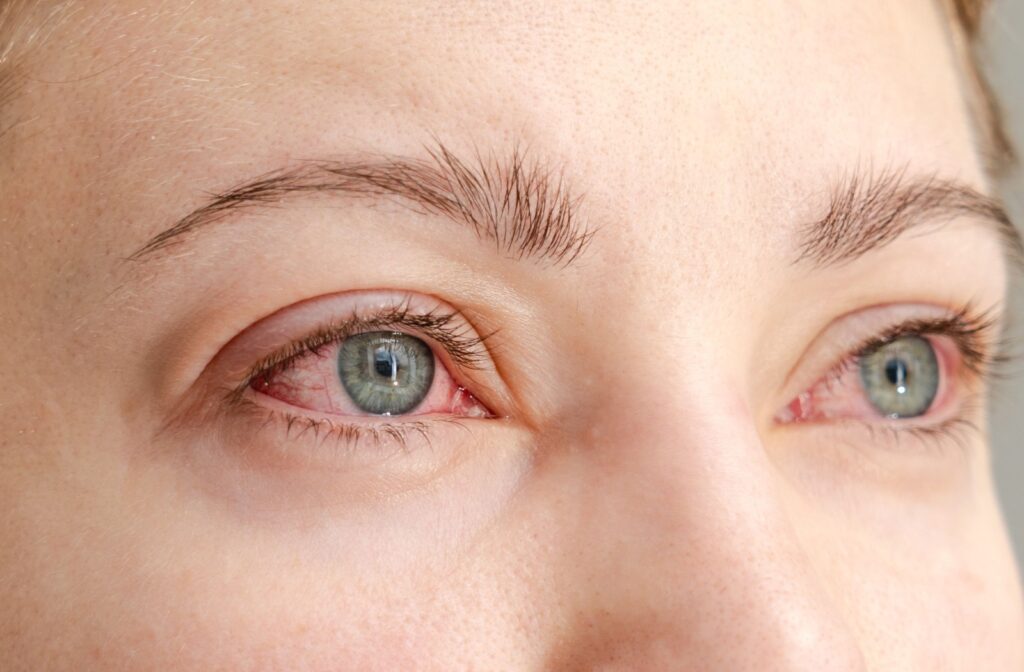Eye allergies are an aggravating, yet common occurrence. They can make ordinary tasks like working, reading, or even enjoying a sunny day much harder than they need to be. Itchy, red, or dry eyes often make many people reach for allergy medication or over-the-counter drops, assuming their discomfort is caused by exposure to allergens.
But what happens if only one of your eyes is affected? This situation is far less talked about. Yes, it’s rare, but you actually can get allergies in only one eye.
That said, there’s more to this topic than meets the eye. Other eye diseases can seem like allergies at first glance, and understanding the differences can empower you to seek timely treatment.
What Are Eye Allergies?
Eye allergies, sometimes called allergic conjunctivitis, occur when the eyes react to allergens in the environment. Allergies are an intricate process related to the body’s immune system, but ultimately, they’re an overreaction to a normally harmless trigger, called an allergen. Common allergens include pollen, dust mites, mold, cigarette smoke, and pet dander.
The primary eye-related symptoms of allergies include:
- Redness
- Swelling
- Intense itching or burning sensations
- Increased tearing or watery eyes
- Sensitivity to light
These reactions usually happen in both eyes when allergens come into contact with both eyes simultaneously.
Is It Possible to Have Allergies in Only One Eye?
Although unusual, allergies occasionally affect one eye exclusively. This can happen when only one eye has localized exposure to an allergen. For example, spending time outdoors on a windy day might cause pollen to settle into one eye, while the other eye is protected by bangs or glasses.
However, it’s important to note that allergies are typically symmetrical. If symptoms persist in only one eye, a simple seasonal allergy may not be the primary cause. Other potential issues include:
- Vernal keratoconjunctivitis (VKC), a rare but serious eye allergy that often affects only one eye. This is a chronic condition that tends to affect young males with a family history of allergies. It’s triggered by the same allergens that can cause other types of allergic reactions, but the symptoms are generally much more extreme and could lead to vision impairment if untreated.
- Giant papillary conjunctivitis (GPC), which is commonly associated with contact lens wear. GPC can cause redness, itching, soreness, increased mucus production, and a feeling like there’s something in your eye. Like eye allergies, it typically affects both eyes, but it’s not uncommon for the irritation to favor one eye over the other.
Regular cleaning and proper management of contact lenses are essential to prevent or manage this condition effectively.

Other Conditions You Might Mistake for Allergies
While it’s tempting to assume allergies are the culprit, there are other conditions that cause similar symptoms. These include:
- Eye infections (Pink eye): Viral or bacterial infections can start in one eye and spread to the other, but symptoms might begin in just one.
- Dry eye: Sometimes, one eye produces fewer tears than the other, such as due to a blocked tear duct, leading to localized irritation.
- Foreign objects: Something as small as a speck of dust could irritate one eye.
- Eye injury: A minor scratch or exposure to irritants like chemicals can mimic allergy symptoms in one eye.
If your symptoms are isolated to one eye and worsen or persist, it’s critical to talk to your doctor.
When to See an Eye Doctor
Persistent redness, itching, or tearing can be cause for concern, especially when they don’t resolve with typical allergy treatments. It’s a good idea to visit your optometrist if your symptoms don’t get better or worsen.
Additionally, if you experience any of these warning signs, it’s time to schedule an eye exam:
- Pain or severe discomfort
- Blurry vision or sensitivity to light
- Discharge or crusting around the eye
- Persistent symptoms lasting more than 48 hours
Getting an expert opinion is the fastest way to determine whether your symptoms are linked to allergies or another condition requiring treatment.
Simple Tips for Managing Eye Allergies
Eye allergies usually fade once you move away from the triggering allergen, but there are steps you can take to reduce irritation keep allergies at bay:
- Use a cool compress to soothe itching or redness.
- Wash your hands frequently, especially if you’ve been outside or in contact with pets.
- Keep windows closed during high pollen seasons to minimize exposure.
- Replace pillowcases and bedding weekly to avoid dust and allergens.
- Try over-the-counter histamine eye drops or artificial tears for temporary relief.
- Avoid rubbing your eyes, which can worsen irritation or introduce new irritants.
We understand how eye discomfort can interfere with your daily life. That’s why Old Town Optix Optometry offers solutions to address a range of eye concerns. If you’re not sure what’s causing your issues, allergy testing is one of the best ways to determine your triggers.
From consultations to specialized treatments for eye allergies and irritation, our eyecare professionals are committed to helping you find relief.
Find Relief for Eye Allergies With Old Town Optix
When eye allergies disrupt your day, relief starts with uncovering the root cause. Whether it’s localized symptoms or something more widespread, our professionals are here to provide guidance and effective treatments tailored to your needs.
Take the first step toward clearer, more comfortable vision today with Old Town Optix Optometry. Schedule an appointment and experience the personalized care that sets us apart!



